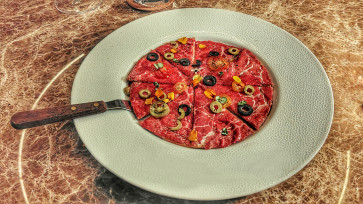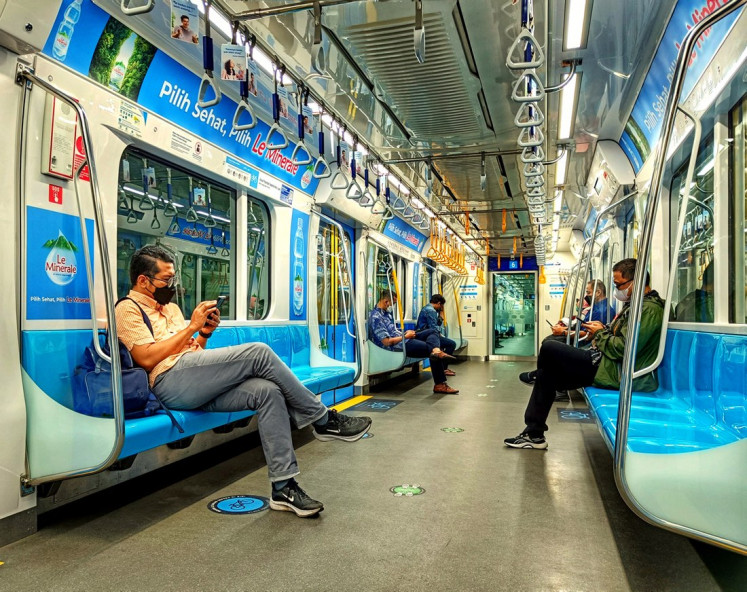Popular Reads
Top Results
Can't find what you're looking for?
View all search resultsPopular Reads
Top Results
Can't find what you're looking for?
View all search resultsFrom Japan to Jakarta: Rising popularity of ramen
Courtesy of IppudoJapanese cuisine can be found at every level of Jakarta’s dining scene, from fine dining restaurants to malls to warung on street corners
Change text size
Gift Premium Articles
to Anyone
Courtesy of Ippudo
Japanese cuisine can be found at every level of Jakarta’s dining scene, from fine dining restaurants to malls to warung on street corners. But the dish that seems to be growing the fastest in popularity is Japan’s iconic noodle soup, ramen.
Since Indonesia is the second-largest noodle-consuming country in the world after China, it’s no surprise that ramen is so popular here.
Nana Tjioe, a student from Jakarta, is one of the city’s many ramen lovers. She says her favorites are tonkotsu (pork broth) and miso ramen. For her, it’s the “complexity” and “richness” of the broth that she likes, not just the noodles.
Ippudo Indonesia director Amanda Sihombing said noodles had a very close connection to the country because of the Chinese cultural influence. “We have a lot of Indonesian noodles as well. We have mie goreng [fried noodles], mie tek-tek [noodle soup]; these all came from Chinese noodles,” she said.
Noodle dishes like mie goreng and mie tek-tek have always been a staple in the Indonesian diet, but Amanda believes ramen could fill a similar niche. “Indonesians accept noodles as a main dish, aside from rice. That’s why Indonesians have accepted ramen,” she explained.
The Ippudo ramen chain has been around in Japan since 1985, and first opened its doors in Indonesia in 2014. Famous for its pork broth ramen, the chain has more than 90 stores in Japan and 55 around the world.
Amanda believes most Indonesians still think about sushi when they talk about Japanese food, but says this doesn’t reflect the reality.
“Actually, sushi is not the number one food in Japan. The number one Japanese food in Japan is ramen. They have a lot of ramen shops, small kiosks, everywhere in Japan,” she said.
Nana also feels that the popularity of sushi sometimes outshines ramen.
“There are still a lot of restaurants that don’t showcase the ramen well, because sushi stands out more,” she says “I’d say ramen is head-to-head with sushi [in terms of] authenticity.”
A Japanese External Trade Organization (JETRO) survey in 2014 showed that over 50 percent of respondents in Jakarta chose Japanese food as their favorite foreign cuisine. The survey also showed that sushi was indeed the most popular Japanese dish in Indonesia, with ramen following at a close second.
One limitation that ramen outlets face is people choosing not to eat there for religious reasons. Muslims cannot eat tonkotsu ramen, the dish that uses broth made from pork bones and is highly prized in Japan.
Some 12 percent of respondents in the survey said they did not buy Japanese products because of “conflict of religion”, while 10 percent of respondents said their faith was an important factor in choosing what food products to buy.
Japanese chains like Ippudo are responding by highlighting the “pork free” choices on their menu. Ramen that is served in a soy sauce, miso or chicken broth are especially popular in Indonesia.
Ippudo serves many pork dishes in Indonesia. In fact, for the first six months after opening in Jakarta, it did not serve any chicken broth ramen. But the chain changed its local menu to reflect customer demand.
“We had six months’ preparation to study the market here and how to develop this chicken ramen that our Muslim customers can accept,” said Amanda.
The menu got another update last week with the new “Grand Menu”, an expanded menu that includes more than 20 new items, many of which are unique to Ippudo Indonesia and do not include pork. Such a range of 100 percent pork-free options is not available at Ippudo outlets in other countries.
Other Japanese ramen chains have found success in Jakarta by offering an entirely halal menu.
Seirock-ya Ramen’s first store outside Japan was its Jakarta outlet, and the chain wants Indonesian diners to be able to try authentic Japanese ramen. Its menu is completely pork-free, using chicken instead. The broth at Seirock-ya differs from the typical chicken broth offered at ramen outlets. Called “toripaitan”, which roughly translates to “cloudy chicken”, it was created to imitate the tonkotsu broth in terms of its creaminess and richness.
Marutama Ramen, another ramen purveyor from Japan that specializes in toripaitan, has also found success in the Indonesian market with their chicken broth.
Ippudo Indonesia, although it may not be fully halal, accommodates Muslim diners with its 100 percent pork-free chicken broth.
“We make it in a separate area, we make sure we use separate utensils, we also use different bowls, chopsticks and spoons. And this is only at Ippudo Indonesia,” said Amanda.
It is unlikely Ippudo would ever go fully halal, however, because Ippudo’s tonkotsu soup is iconic to the brand.
Pork or no pork, ramen’s growing popularity in Jakarta is undeniable.
_________________________________________
The writer is an intern under the ACICIS program.










